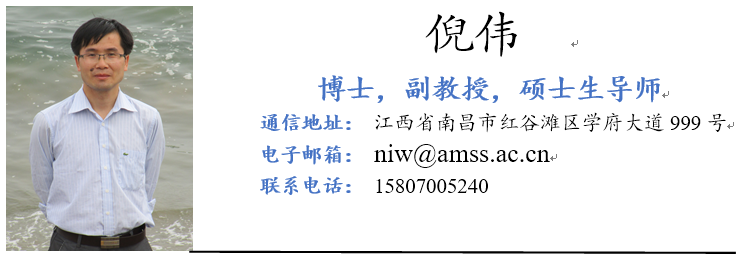倪伟简介
2021-04-07

![]() 简介
简介
倪伟, 男,1978年生于湖北武汉,2010年毕业于中国科学院数学与系统科学研究院,并获得理学博士学位,同年入职南昌大学理学院,2014年晋升为数学系副教授,现为南昌大学理学院、南昌大学信工学院硕士生导师。2015年入选南昌大学“215 人才工程”赣江青年学者(2015- 2020), 2018年以访问学者身份对纽约大学进行为期一年的学术访问。主要从事控制优化等方面的研究,并在本领域主流国际期刊Automatica,Systems and Control Letters, Journal of Franklin Institute等上发表发表论文近30篇,其中SCI期刊论文18篇,其他论文10余篇。截止到2021年3月,所有论文的google学术引用次数1600 余次,H指数13,H10指数15,其中发表在Systems and Control Letters上的论文被引超过1000次,并入选ESI高被引论文。主持2项自然科学基金,2项江西省自然科学基金,1项江西省教育厅自然科学基金。
![]() 研究领域
研究领域
切换系统的混杂控制理论,
多智能体系统的分布式控制理论, 分布式优化理论与算法,
网络化系统的分析与控制,
随机系统的多尺度分析与大偏差理论
![]() 教育背景
教育背景
中国科学院数学与系统科学研究研, 2006年9月-2010年1月, 博士. 武汉大学, 2004年9月-2006年6月,硕士.
湖北师范大学,1997年9月-2001年6月,学士.
1. 国家自然科学基金地区基金,61663026,基于随机平均的多智能体系统趋同控制及其在分布式 状态估计中的应用,2017/01-202012,39万元. (结题,主持)
2. 国家自然科学基金青年基金,61304161,基于平均理论的高阶线性多智能体系统趋同控制问题 研究,2014/01-2016/12,22万元. (结题,主持)
3. 江西省自然科学基金面上基金,基于多尺度理论的随机多智能体系统趋同控制及其在分布式优 化中的应用,2019/07-2022/07,6万元. (在研,主持)
4. 江西省自然科学基金青年基金,20132BAB211037,切换系统的有界控制问题研究,2013/07- 2016/07,2万元. (结题,主持)
5. 江西省教育厅自然科学基金青年项目,通信受限下的高阶多个体系统的趋同问题,2012/01- 2013/12, 1 万元. (结题,主持)
![]()
[1] Wei Ni and Xiaoli Wang, “A Multi-Scale Method for Distributed Convex Optimization with Constraints”, arXiv:2103.00419, https://arxiv.org/abs/2103.00419, 2021.
[2] Rui Sheng and Wei Ni, “Distributed constrained optimization via continuous-time mirror design”, Ad- vances in Difference Equations, vol. 2018, no. 1, pp. 1-15, 2018.
[3] Jinhuan Wang, Pengxiao Zhang, and Wei Ni, “Observer-based event-triggered control for consensus of general linear MASs”, IET Control Theory & Applications, vol. 11, no. 18, pp. 3305-3312, 2017.
[4] Wei Ni and Xiaoli Wang, “Averaging approach to distributed convex optimization for continuous-time multi-agent systems”, Kybernetika, vol. 52, no. 6, pp. 898-913, 2016.
[5] Wei Ni, Dongya Zhao, Yuanhua Ni, and Xiaoli Wang, “Stochastic averaging approach to leader-following consensus of linear multi-agent systems”, Journal of the Franklin Institute, vol. 353, no. 12, pp. 2650-2669, 2016.
[6] Wei Ni, Ping Zhao, Xiaoli Wang, and Jinhuan Wang, “Event-triggered control of linear systems with saturated inputs”, Asian Journal of Control, vol. 17, no. 4, pp. 1196-1208, 2015.
[7] Wei Ni and Ping Zhao, “Review on averaging-based consensus of high-order multi-agent linear systems”, Journal of System Science and Mathematical Science (Chinese Series), vol. 35, no. 10, pp. 1146-1160, 2015.
[8] Xiaoli Wang, Wei Ni, and Zhibin Ma, “Distributed event-triggered output regulation of multiagent sys- tems”, International Journal of Control, vol. 88, no. 3, pp. 640-652, 2015.
[9] Dongya Zhao, Wei Ni, and Quanmin Zhu, “A framework of neural networks based consensus control for multiple robotic manipulators”, Neurocomputing, vol. 140, no. 22, pp. 8-18, 2014.
[10] Wei Ni, Xiaoli Wang, and Chun Xiong, “Consensus controllability, observability and robust design for leader-following linear multi-agent Systems”, Automatica, vol. 49, no. 7, pp.2199-2205, 2013.
[11] Wei Ni, Chun Xiong, and Jie Yang “Leader-following consensus of high-order multi-agent systems with nounded transmission channels”, International Journal of Systems Science, vol. 44, no. 9, pp. 1711-1725, 2013.
[12] Xiaoli Wang, Wei Ni, and Jie Yang, “Distributed output regulation of switching multi-agent systems subject to input saturation”, IET Control Theory & Applications, vol. 7, no. 2, pp. 202-209, 2013.
[13] Wei Ni, Xiaoli Wang, and Chun Xiong, “Leader-following consensus of multiple linear systems under switching topologies: an averaging method”, Kybernetika, vol. 48, no. 6, pp. 1194-1210, 2012.
[14] Wei Ni and Daizhan Cheng, “Stabilization of switched linear systems with constrained inputs”, Journal of Systems Science and Complexity, vol. 25, no. 1. pp. 60-70, 2012.
[15] Xiaoli Wang, Wei Ni, and Xinsheng Wang, “Leader-following formation of switching multi-robot systems via internal model”, IEEE Transactions on Systems, Man, and Cybernetics-Part B: Cybernetics, vol. 42, no. 3, pp. 817-826, 2012.
[16] Wei Ni and Daizhan Cheng, “Leader-following consensus of multi-agent systems under fixed and switching topologies”, Systems & Control Letters, vol. 59, no. 3-4, pp. 209-217, 2010.
[17] Wei Ni and Daizhan Cheng, “Control of switched linear systems with input saturation”, International Journal of Systems Scienc, vol. 41, no. 9, pp. 1057-1065, 2010.
[18] Daizhan Cheng, Yupeng Qiao, and Wei Ni, “Design of control invariant sets of planar systems”, Journal of System Sciences & Complexity, vol. 22, no. 4, pp. 614-626, 2009.
![]()
[19] Shihua Chen, Wei Ni, and Changping Wang, “Positive solution of fourth order ordinary differential equation with four-point boundary conditions”, Applied Mathematics Letters, vol. 19, no. 2, pp. 161-168, 2006.
[1] Wei Ni, “Global Optimization for Stochastic Programming Via Sequential Monte Carlo Sampling”, in Proceedings of the 38th Chinese Control Conference, Guangzhou, China, pp. 2070-2075, 2019.
[2] Wei Ni and Zhong-Ping Jiang “On Regularization Schemes for Data-Driven Optimization”, in Proceedings of the 31th Chinese Control And Decision Conference, Nanchang, China, pp. 3016-3023, 2019.
[3] Wei Ni and Xiaoli Wang, “Robust stability, stabilization and L2-gain analysis of uncertain switched linear systems”, in Proceedings of the 27th Chinese Control and Decision Conference, Qindao, China, pp. 2025- 2030, 2015.
[4] Xiaoli Wang, Wei Ni, and Jie Yang, “Distributed output regulation of switching multi-agent systems subject to input satuaration”, in Proceedings of the 10th World Congress on Intelligent Control and Automation, pp. 840-845, 2012.
[5] Xiaoli Wang and Wei Ni, “Event-triggered output regulation for linear multi-agent systems”, in Proceedings of the 31th Chinese Control Conference, pp. 6177-6182, 2012.
[6] Wei Ni, Xiaoli Wang, and Jie Yang, “Structural Properties of Multi-Agent Linear Systems with Applica- tions to Leader-Following Consensus”, in Proceedings of the 10th World Congress on Intelligent Control and Automation, pp. 2551-2555, 2012.
[7] Wei Ni, xiaoli wang, and Xiong Chun, “Distributed Control of Networked Linear Systems via Observer- Based Consensus Algorithms”, in Proceedings of the 31th Chinese Control Conference, pp. 1174-1178, 2012.
[8] Wei Ni, Xiaoli Wang, and Chun Xiong, ”Distributed Luenberger Observers for Linear Systems”, in Pro- ceedings of the 10th World Congress on Intelligent Control and Automation, pp. 4267-4271, 2012.
[9] Wei Ni, ”Guiding a Group of Networked Linear systems Through Constrained Communications”, in Pro- ceedings of the 30th Chinese Control Conference, 479-483, 2011.
[10] Wei Ni, Daizhan Cheng, and Xiaoming Hu, ”Minimum Dwell Time for Stability and Stabilization of Switched Linear Systems”, in Proceedings of the 7th World Congress on Intelligent Control and Automation, pp. 4109-4115, 2008.
[11] Wei Ni, Huashu Qin, and Daizhan Cheng, ”Control of Switched Linear Systems via Saturated Input”, in Proceedings of the 27th Chinese Control Conference, PP. 479-483, 2008.
![]()
南昌大学数学与计算机学院
School of Mathermatics and Computer Sciences,Nanchang Uniersity
地址:南昌大学前湖校区理科生命大楼A区四楼
电话:0791-83969506
邮箱:@ncu.edu.cn
常用链接

学院微信公众号